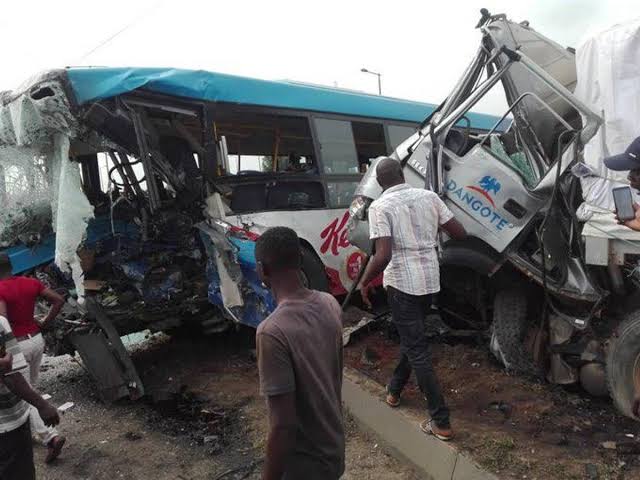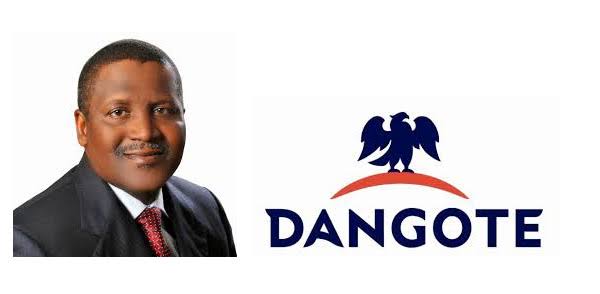The Dangote Group, Africa’s largest conglomerate and a dominant force in Nigeria’s manufacturing and logistics sectors, has built a vast network of cement, sugar, salt, and flour operations. However, alongside its industrial successes, the company’s heavy-duty truck operations have frequently made headlines for tragic reasons road accidents involving Dangote-branded vehicles. Over the years, these incidents have sparked national debate on corporate responsibility, road safety, and regulatory enforcement.
This article examines some of the most notable truck-related accidents linked to the Dangote Group, including the recent case involving a relative of a popular Nigerian reality TV star, and assesses the company’s responses over time.
The Recent Auchi Incident – August 2025
The most recent case involves Ruth Otabor, younger sister of BBNaija Season 7 winner, Ijeoma Josephina Otabor (popularly known as Phyna). On August 13, 2025, a Dangote truck struck Ruth in Auchi, Edo State, causing severe injuries that led to the amputation of one leg.
Following public outcry, the Dangote Group issued a statement pledging comprehensive medical care and appropriate compensation under its welfare policies. Senior company representatives, accompanied by insurance officials, visited both the accident site and Ruth’s family at the Irrua Specialist Teaching Hospital.
Talks are still ongoing on social media as users are still commenting and reacting to the issue and calling out the company. Even a popular X influencer, has called out for people who have been affected in the past by these accidents to come online to share their experiences and proof of the harms Dangote Group trucks has done in the past.

Some Past Cases of Dangote Truck Accidents
Kogi State – February 2017
In early 2017, tragedy struck on the Lokoja–Abuja Highway when a Dangote truck collided head-on with a motorcycle carrying two young men, Caleb Idakwoand Prosper Ojodale. Both victims died instantly. The incident was further compounded by delayed emergency intervention due to a doctors’ strike in the state. The police impounded the truck while investigations were carried out.
Lagos–Ibadan Expressway (Arepo) – April 2017
Later that year, another Dangote truck made headlines when its driver, allegedly driving against traffic, ran over and killed three pedestrians near ItoriComprehensive High School in Arepo. The driver fled the scene but was apprehended by local residents before being handed over to the police.
Abuja–Lokoja Expressway – November 2017
A devastating crash involving a Dangote truck and a vehicle transporting cattle traders at Jamata village in Kogi State resulted in sixteen fatalities. The Dangote Group eventually provided ₦500,000 to each bereaved family, after an initial sum of ₦50,000, bringing the total payout to ₦8 million.
(Daily Trust, 2017: https://dailytrust.com/families-of-dangote-truck-accident-victims-get-n500-000-each/)
Umuchu, Anambra – 2018
In 2018, a Dangote cement truck lost control and plowed into the bustling Afo Ibughubu Market in Umuchu, Anambra State. The collision claimed at least three lives and injured seven others. Through its insurer, NEM Insurance Plc, the company paid ₦10 million in compensation to victims and their families.
(ThisDay, 2019: https://www.thisdaylive.com/index.php/2019/06/09/dangote-compensates-victims-of-anambra-truck-accident/)
Lagos–Abeokuta Expressway (Toll-Gate, Sango–Ota) – May 2020
A brake failure in a Dangote truck led to a chain collision involving multiple vehicles and motorcycles, killing two people and injuring seven others. The driver escaped the scene, while police and emergency agencies worked to prevent a mob from setting the truck ablaze.

Ota, Ogun State – February 2020
Just months earlier, another cement-laden Dangote truck was involved in a high-casualty crash on the Lagos–Abeokuta Expressway in Ota, Ogun State. The incident left seven people dead and ten injured. Enraged residents set the truck on fire before emergency responders arrived. Preliminary reports pointed to brake failure and excessive speeding as contributing factors.
Agbor, Delta State – April 2019
A pedestrian lost his life after being struck by a fully loaded Dangote truck along the Lagos–Asaba Expressway near Agbor. In retaliation, a mob burnt the truck to ashes before authorities could intervene.
Mosinmi–Sagun Road (Ogun State) & Lagos – August 2020
On the Mosinmi–Sagun Road in Ogun State, a Dangote truck ran over and killed a motorist and a female pedestrian. Around the same period in Lagos, another Dangote vehicle was involved in a separate fatal crash. No formal compensation was publicly reported for these incidents.
Adekunle Ajasin University, Ondo State – January 2021
A particularly harrowing incident occurred when a Dangote truck, reportedly experiencing brake failure, rammed into shops near the university gate in Akungba-Akoko. Eight students lost their lives. In response, the company provided ₦500,000 to each bereaved family and pledged additional support.
(Premium Times, 2021: https://www.premiumtimesng.com/news/top-news/445735-dangote-group-compensates-ondo-accident-victims-officials.html)

Patterns, Concerns, and Public Reaction
An analysis of these incidents reveals recurring factors:
- Mechanical faults, particularly brake failure, feature prominently.
- Driver behavior, including overspeeding and dangerous driving, has been cited repeatedly.
- Public anger is a frequent outcome, with multiple instances of mobs destroying Dangote trucks after accidents.
- Compensation policies appear inconsistent — ranging from no public acknowledgment to substantial payouts, often influenced by media coverage and public pressure.
Corporate Responsibility and the Road Ahead
The Dangote Group’s swift response in some cases, such as the Auchi incident and the Anambra market crash, shows a willingness to take responsibility. However, the persistence of such accidents raises questions about fleet maintenance, driver training, and enforcement of road safety standards.
Suggestions that could mitigate these tragedies by:
1.Implementing stricter vehicle maintenance protocols.
2. Expanding driver safety training programs.
3. Introducing onboard vehicle monitoring systems to track speed and mechanical health.
4. Collaborating with government regulators to enforce higher safety standards for heavy-duty transport.
Given the Dangote Group’s prominence and influence in Nigeria’s economy, its approach to road safety could set the standard for other logistics-intensive companies. The hope is that the lessons from these repeated tragedies and the public scrutiny they attract will translate into long-term, systemic safety reforms.
